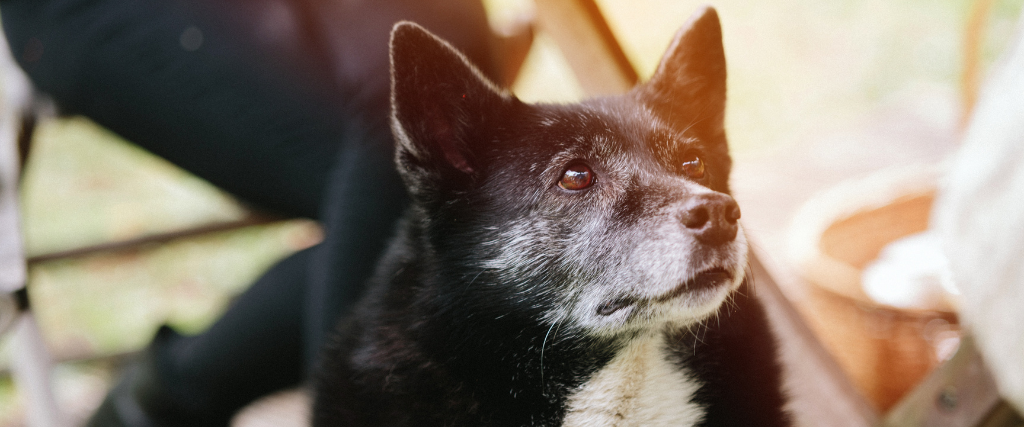Dogs are often categorized as senior dogs by a combination of their breed and age, with small breeds considered "senior" at 10-11 years, medium-sized breeds at 8-10 years, and giant breeds at 5-6 years. Genetics and lifestyle are also significant factors in how fast a dog ages, with fit, healthy dogs adding years to their lives. The appearance of gray on a dog's face and muzzle is often the first reminder a dog owner will be caring for a senior dog soon.
As dogs age, their needs change, and their care requirements increase. Help your senior dog maintain the highest quality of life possible and extend their time with you by understanding their unique needs as they enter their senior years.
1. Their Diet Should Change
Much like a puppy requires a specific type of food to fuel its fast-growing body, senior dogs also need a specific diet to maintain their health and weight. Older dogs no longer have the energy of a young dog, which makes them more susceptible to developing obesity. Be sure to consult your veterinarian about a new diet to prevent weight gain that is low in fat and has fewer calories. It's also important to slowly transition them to a new food to avoid any gastrointestinal upset.
In addition to a change in diet, your veterinarian might recommend adding supplements to their diet. Supplements can prove beneficial in helping to slow or minimize the effects of aging, such as joint supplements aiding dogs with osteoarthritis and antioxidants for brain health. The American Kennel Club outlines possible supplements for your aging dog to discuss with your veterinarian.

2. They'll Appreciate New Accommodations in the Home
As dogs age, they become less agile, and navigating the home can become difficult. While a dog used to jump onto a couch or chair easily, joint pain and other ailments typical of senior dogs make these once small feats painful.
The following accommodations can make a senior dog more comfortable at home:
- Place a cozy dog bed on the floor in the main living area as an alternative to the couch
- Place gates in front of stairs, and if your dog is small enough, carry them up and down the stairs when necessary
- Avoid moving furniture around if your dog is losing or has lost its vision
- If you have hardwood flooring, consider throw carpets to help alleviate arthritic pain and slipping
- If your dog sleeps in your bed, invest in dog steps and avoid them attempting to jump

3. They Still Need Plenty of Exercise
The best way to add years to your aging dog's life is to keep them active. While they no longer have the energy or speed of a puppy or young dog, they still benefit significantly from movement. The value of exercise is twofold-for both their physical and mental health. If your dog hasn't been getting regular exercise, start slowly and increase activity moderately once they've built some stamina. If they have any ailments or medical conditions, consult your veterinarian before beginning an exercise regimen to ensure the specific activities won't do more harm than good. Examples of activities that are appropriate for senior dogs include neighborhood walks, fetch, and playing with tug toys.
4. They Should See Their Veterinarian More Often
Regular veterinary care becomes critical as dogs reach their senior years to catch disease early and begin treatment before it causes discomfort or progresses. As dogs age, their immune system weakens, making them more prone to numerous health conditions. It's recommended that senior dogs begin visiting their veterinarians every six months instead of annually for the best possible outcome to any looming medical issues. This also applies to their oral health, as their teeth continue to require regular oral hygiene and care. Hill's Pet Nutrition identifies the top eight ailments your veterinarian will be on the lookout for as your dog ages.
5. Extra Love and Attention are Welcome
Senior dogs can become anxious as they notice their bodies changing, especially when they struggle with hearing and vision. Despite their home and routine remaining unchanged, they will take comfort in knowing you're still by their side. Ease their mind by spending as much quality time with them as possible, even if it's simply snuggling on the couch during the evening or adding an extra play session during the day. Try to plan dog-friendly vacations to avoid boarding facilities and dog sitters, as being in the care of someone else and in an unfamiliar location will heighten their anxiety further. The extra love and attention are good for dog owners as well, as you cherish the remaining years with your four-legged sidekick.
If your dog is entering its senior years, contact us to learn more about caring for them to ensure they live the longest, healthiest life possible.

